Our Mongolian Beef recipe became one of the most popular Woks of Life recipes after we first published it in July 2015, and for good reason!
The Origins of Mongolian Beef
But first. What exactly are the origins of Mongolian Beef? Because it’s definitely not Mongolian…
In fact, in Mongolia, more often than not, home cooks simply boil meat and dip it in sauces. Not exactly a stir-fry.
Everything is served with Bai Jiua stiff, white lightning liquor made of sorghum (usually 90 proof or higher!) very popular in China.
(A friend of mine who visits his Mongolian in-laws almost always ends up drunk and horizontal on the couch after the traditional welcome-home dinner!)
As for the true origins of Mongolian beef, my theory is that someone just forgot to add the orange to a wok full of Orange Beefand added more sugar instead. Hence, the Mongolian Beef recipe was born. (But, as Judy and the girls would say, that’s just my crazy theory/the ramblings of an old coot!)
Anyway, chalk it up to Chinese-American menu planners and marketers who dubbed the dish “Mongolian Beef.”
It’s a close cousin to “Singapore Noodles,” a dish that many actual Singaporeans scratch their heads over––most likely born in the stainless steel kitchen of a Chinese takeout joint!
The Woks of Life Mongolian Beef Recipe
Now that we have that clear, it doesn’t take a genius to know that despite their somewhat misleading names, these Westernized Asian dishes can be GOOD!
P.F. Chang’s version of this dish is probably the most well-known, but, personally, I think their dish is way too sweet, and it’s definitely too sweet for Judy (which is saying something, since she comes from Shanghai, where sweet-savory dishes are often the main event).
In fact, when Judy found out I was going to make a Mongolian beef recipe, the exclamations were strong and immediate: “Too sweet! Too oily! No good! You’re crazy!”
So, I adjusted.
- Cut the sugar–wayyy down.
- Reduce the amount of oil used–wayyy down.
And after the photographs were taken, the Mongolian beef on the plate disappeared before all of our eyes once the rice was served. Amidst the feeding frenzy were these comments, muffled by mouthfuls:
- Sarah: “Holy crap, that’s tasty!”
- Kaitlin: “Daaang, gimme more of that rice!”
- Judy: “WOW. That is SO good!”
- My humble remark: “Ok, you guys were hungry.”
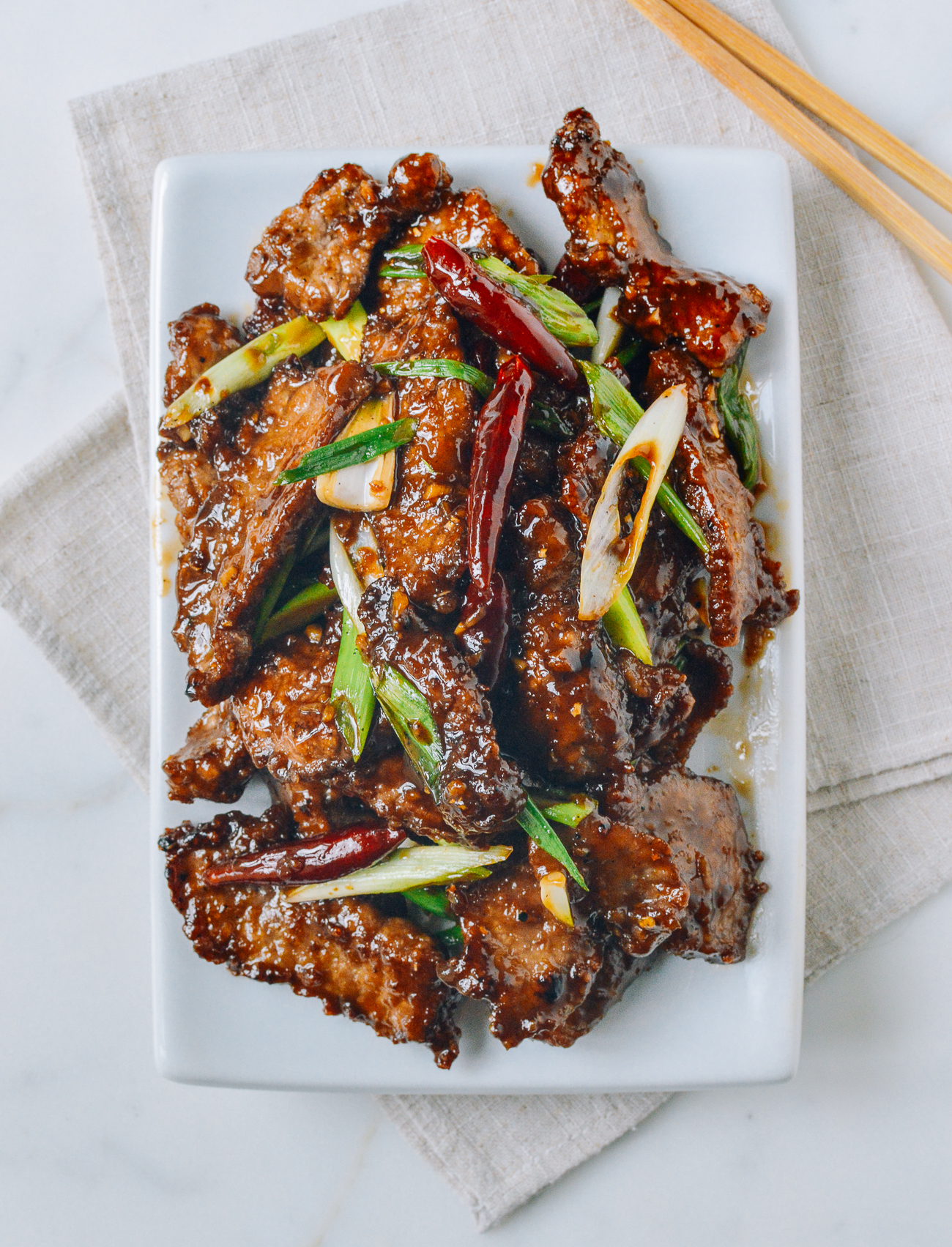

If you would rather have some chicken, then check out our popular Mongolian Chicken recipe!
Note:
This recipe was originally published in 2015. We have since updated it with high-res photos, metric measurements, nutrition information, an instructional VIDEO, and minor adjustments to the recipe for both clarity and convenience. (e.g. the original recipe was for 8 ounces of beef; we have increased it to 1 pound.) Enjoy!
Mongolian Beef Recipe: Instructions
Combine the sliced beef with the marinade ingredients (the neutral oil, Shaoxing wine, light soy sauce, cornstarch, water, and baking soda. Marinate for 1 hour. The beef should still be quite moist after it has marinated. If it looks too dry, add a tablespoon of water to it.
In a small bowl, mix the sauce. Dissolve the brown sugar in the hot water or stock, then stir in the light and dark soy sauces.
Next, dredge the marinated beef slices in the cornstarch until thoroughly coated.
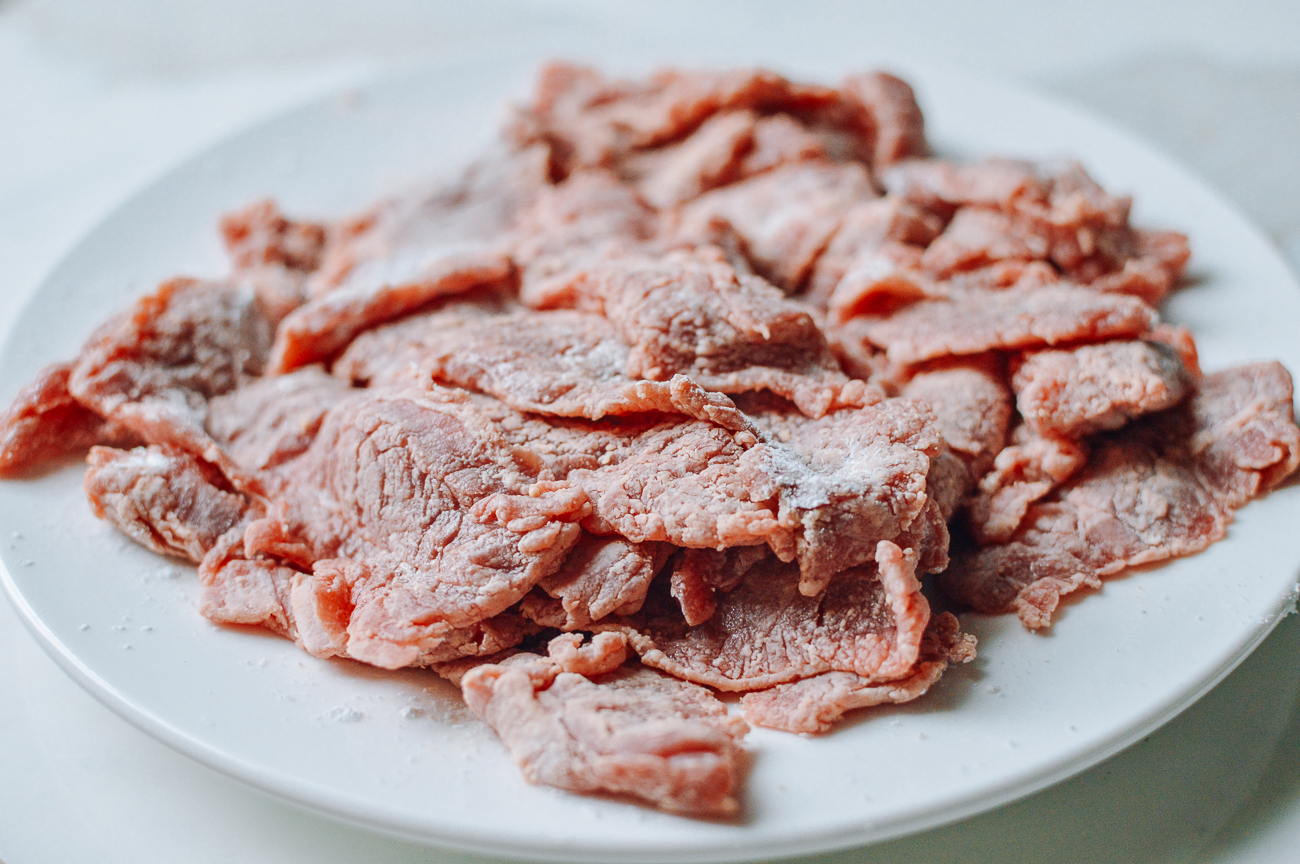

Heat 2/3 cup neutral oil in a wok over high heat. Just before the oil starts to smoke, spread the flank steak pieces evenly in the wok, and sear for 1 minute on each side, until you have a crispy coating. Turn off the heat and transfer the beef to a plate.
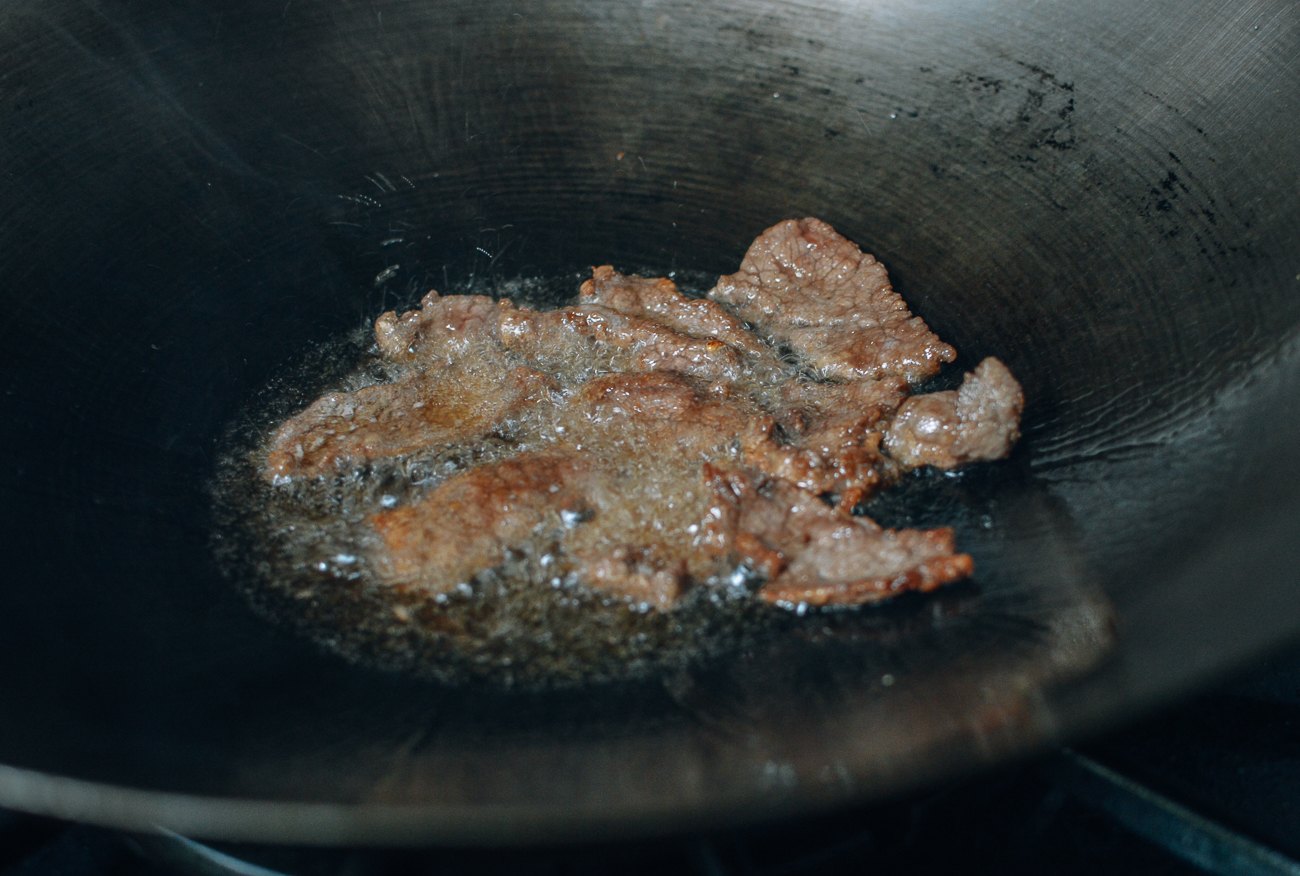

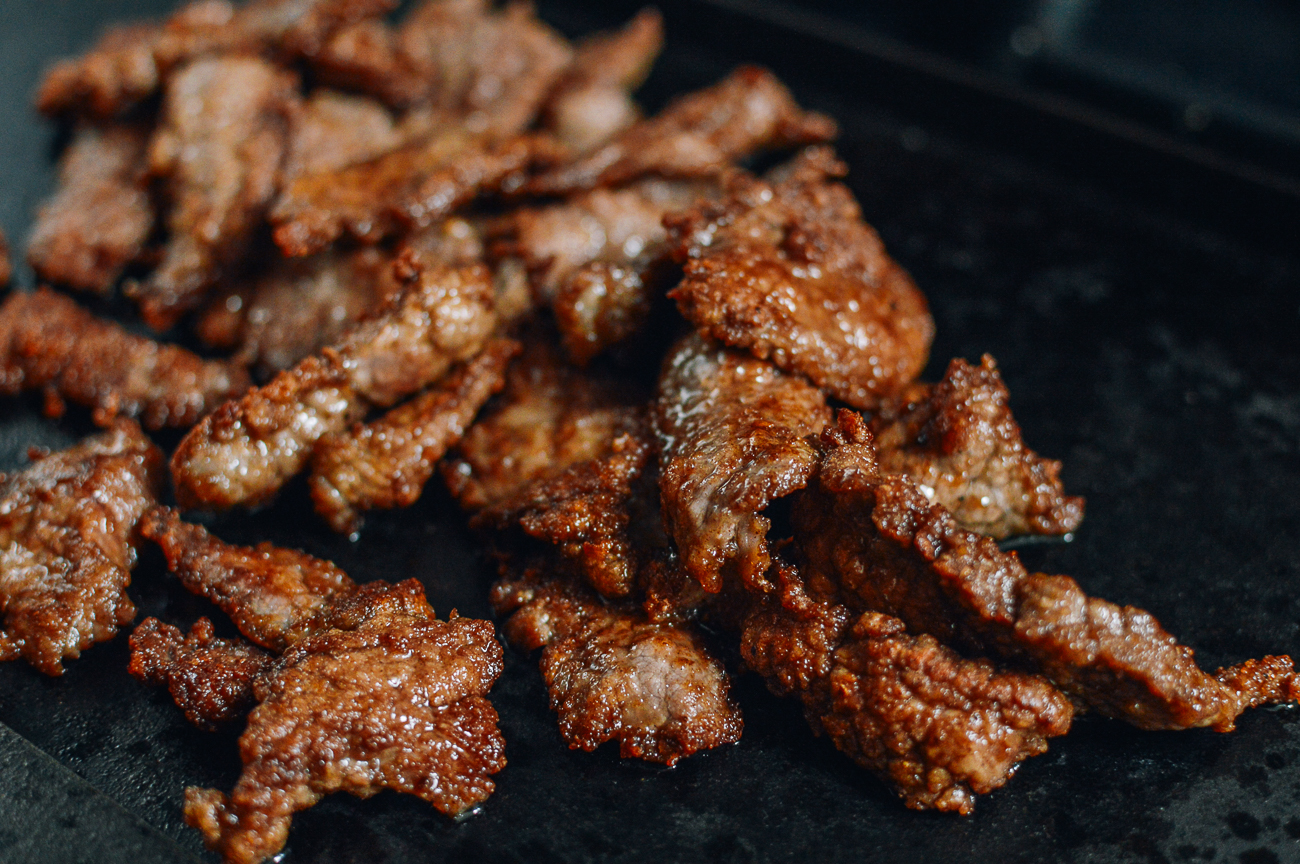

Drain the oil from the wok (save it for other cooking), leaving 1 tablespoon behind. Turn the heat to medium-high. Add the ginger and dried chili peppers, if using. If you want the dish spicier, break 1-2 chilies in half.
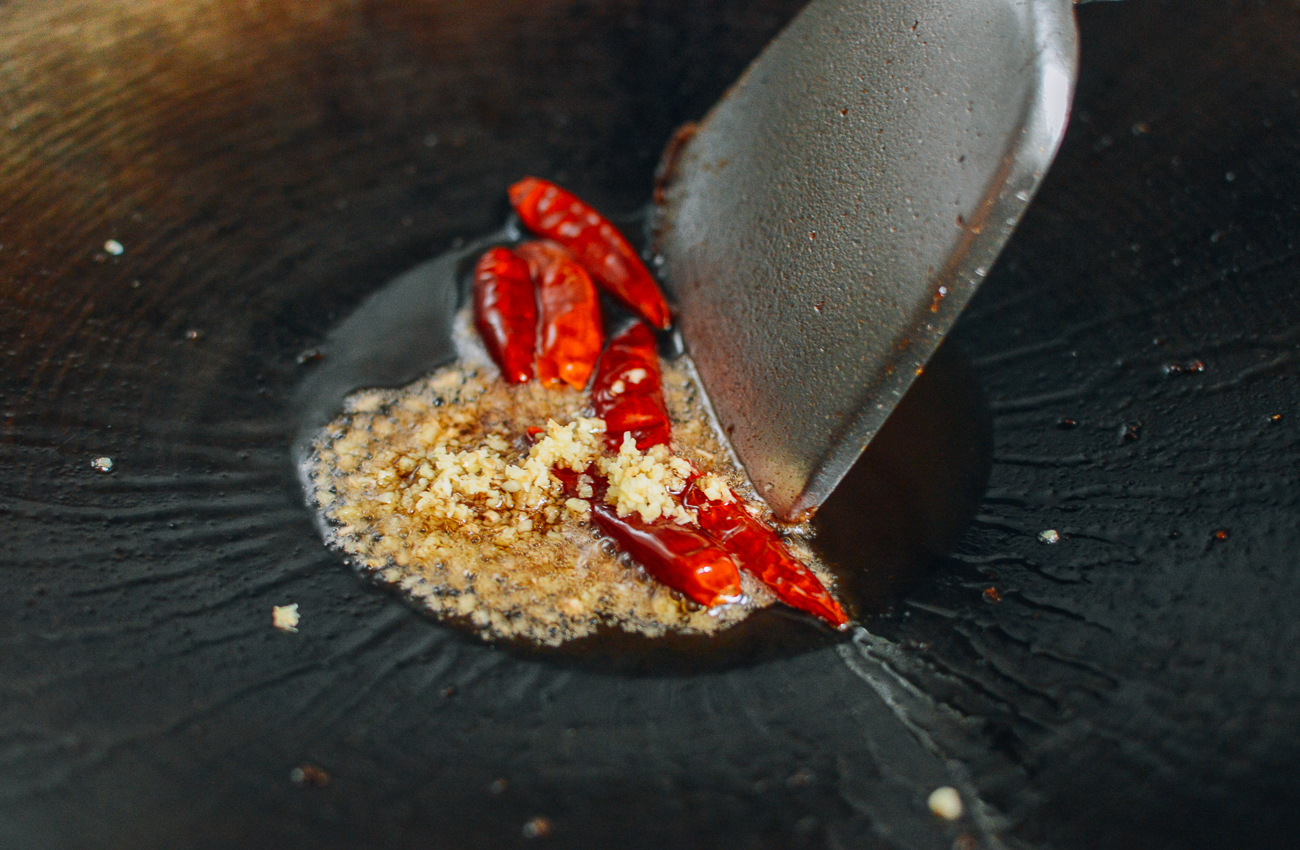

After about 15 seconds, add the garlic and white parts of the scallions. Stir for another 15 seconds and add the premixed sauce.
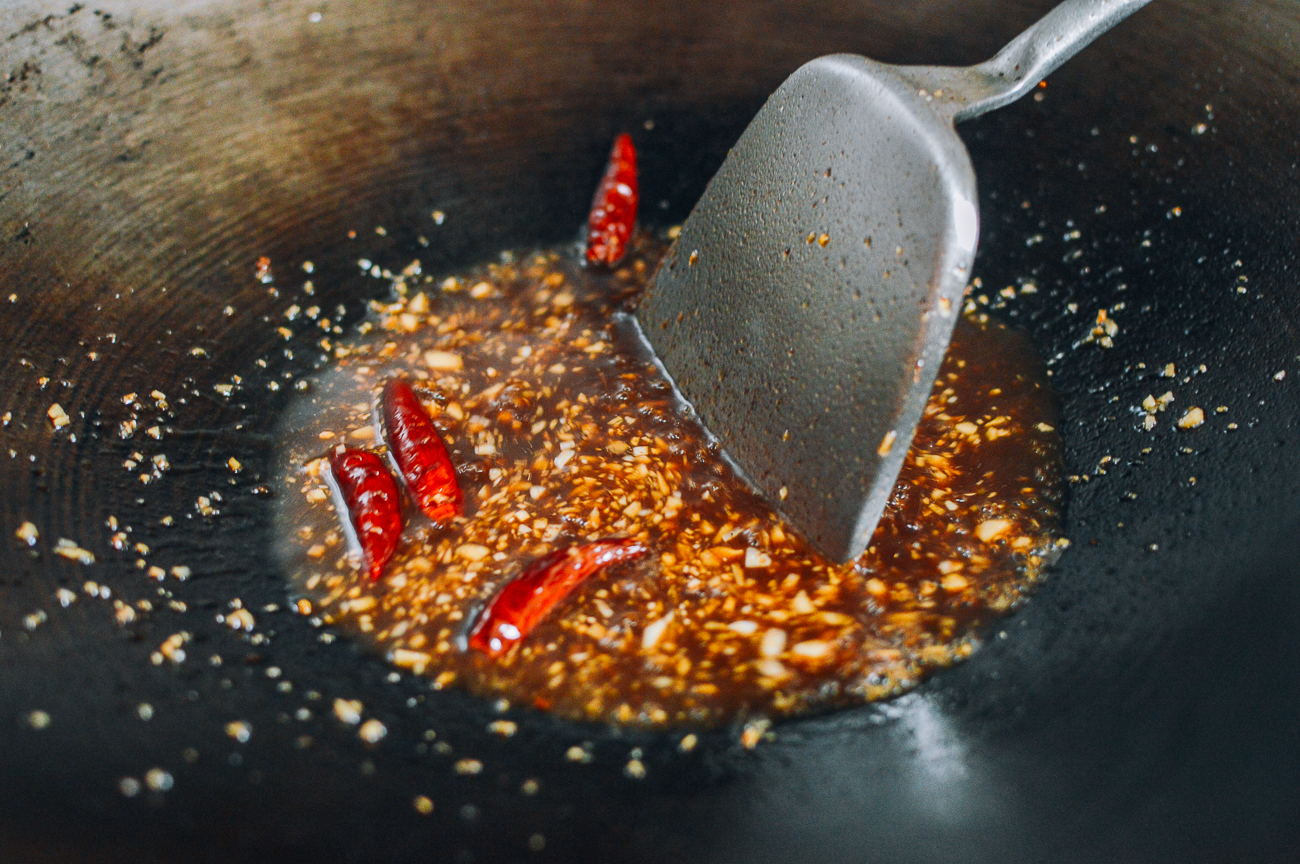

Let the sauce simmer for about 2 minutes, and slowly stir in the cornstarch slurry mixture. Cook until the sauce has thickened enough to coat the back of a spoon.
Add the beef and green parts of the scallions, and toss everything together for another 30 seconds. The scallions should just be wilted, and there should be almost no liquid, as the sauce should be clinging to the beef.
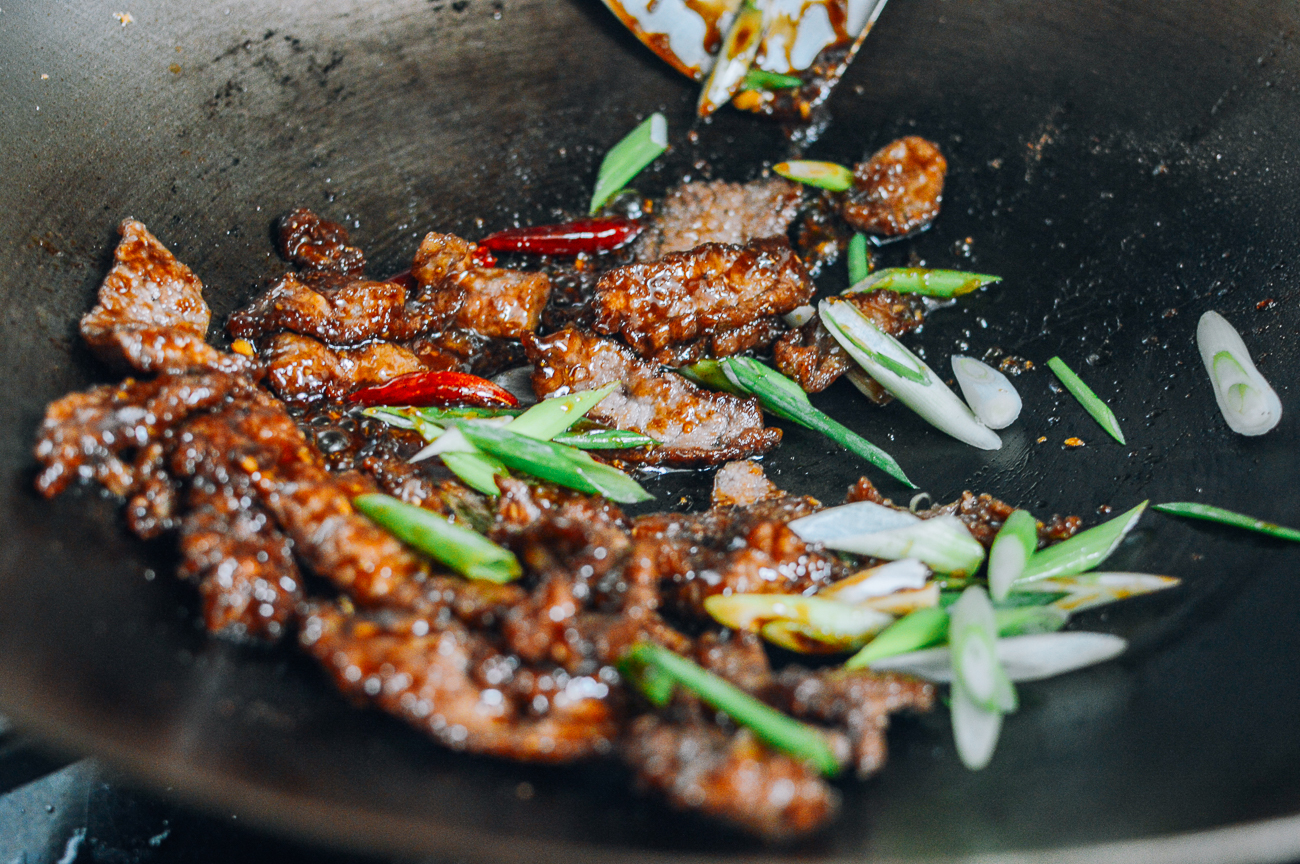

If you still have sauce, increase the heat slightly and stir until thickened.
Plate and serve with hot steamed rice!
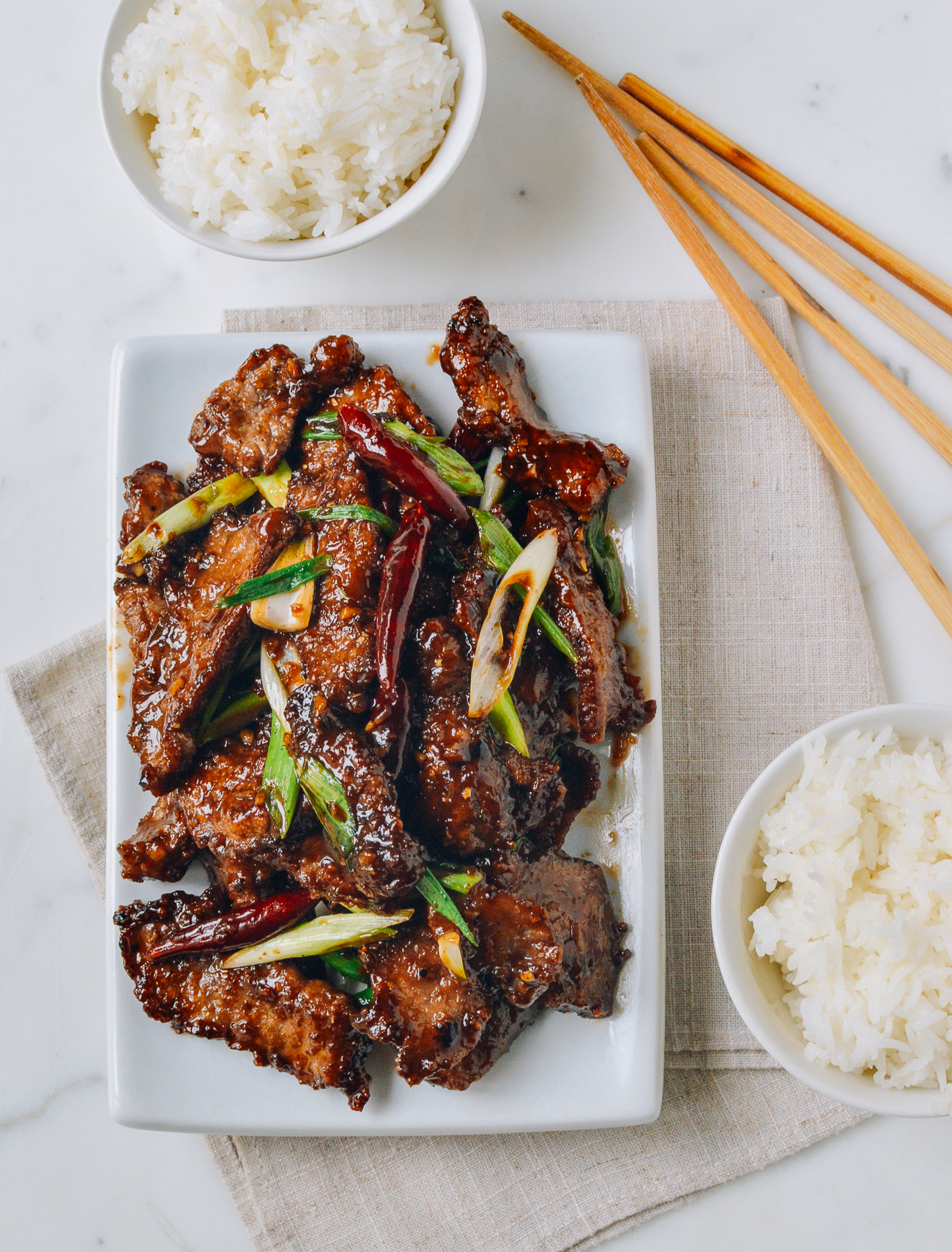

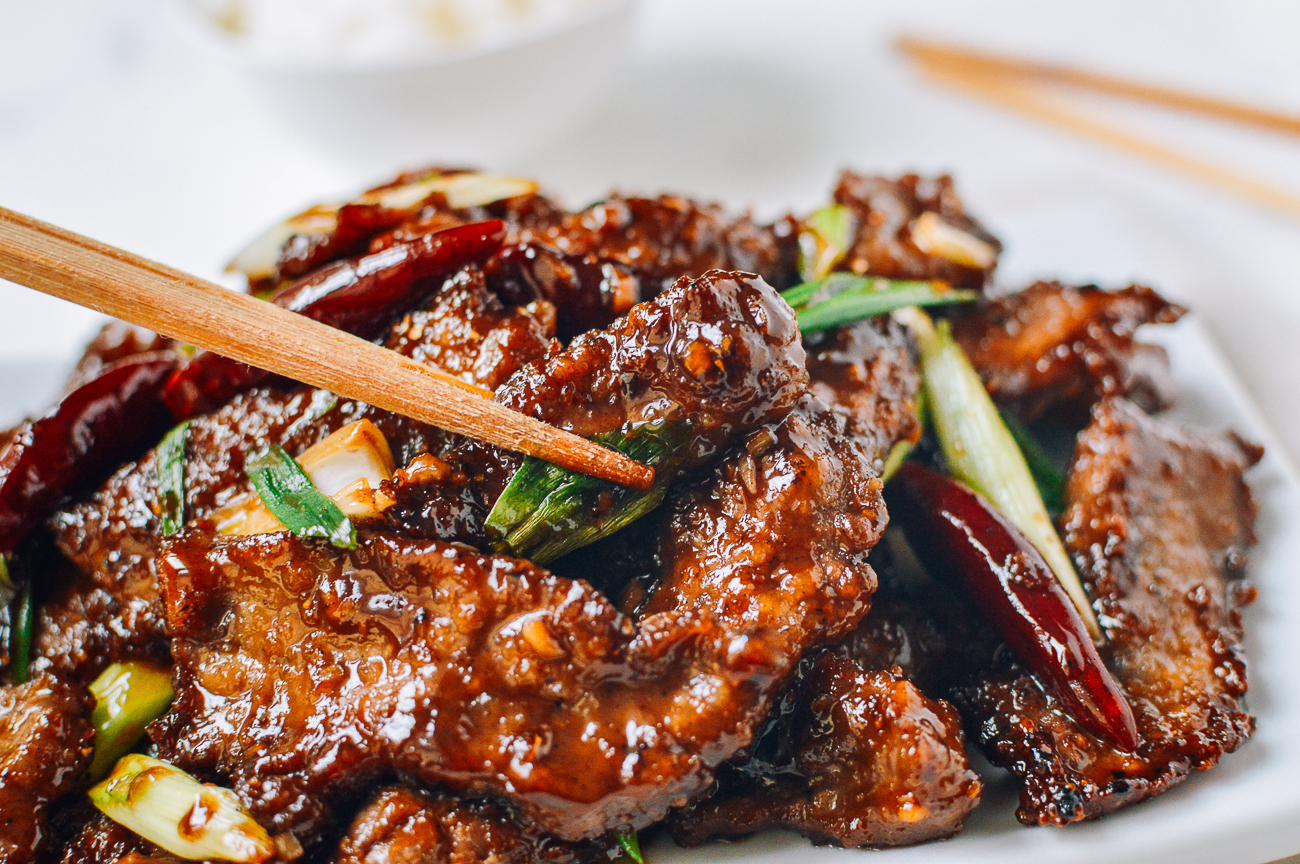

Mongolian Beef
This Mongolian Beef Recipe is a crispy homemade version that’s less sweet and more flavorful than restaurant versions you’re probably used to. It’s one of our top recipes for a reason!
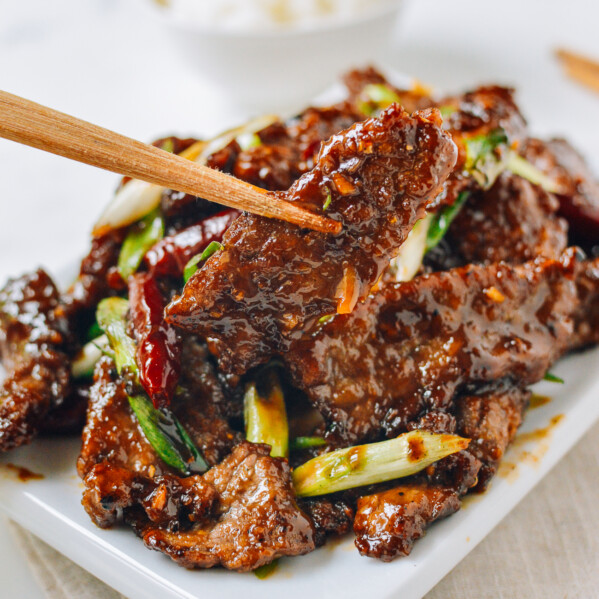

serves: 4
Prep: 35 minutes
Cook: 10 minutes
Total: 45 minutes
Ingredients
For coating and searing the beef:
For the rest of the dish:
Instructions
-
Combine the sliced beef with the marinade ingredients (the neutral oil, Shaoxing wine, light soy sauce, cornstarch, water, and baking soda. Marinate for 1 hour. The beef should still be quite moist after it has marinated. If it looks too dry, add a tablespoon of water to it.
-
In a small bowl, mix the sauce. Dissolve the brown sugar in the hot water or stock, then stir in the light and dark soy sauces.
-
Next, dredge the marinated beef slices in the cornstarch until thoroughly coated.
-
Heat 2/3 cup neutral oil in a wok over high heat. Just before the oil starts to smoke, spread the flank steak pieces evenly in the wok, and sear for 1 minute on each side, until you have a crispy coating. Turn off the heat and transfer the beef to a plate.
-
Drain the oil from the wok (save it for other cooking), leaving 1 tablespoon behind. Turn the heat to medium-high. Add the ginger and dried chili peppers, if using. If you want the dish spicier, break 1-2 chilies in half. After about 15 seconds, add the garlic and white parts of the scallions. Stir for another 15 seconds and add the premixed sauce.
-
Let the sauce simmer for about 2 minutes, and slowly stir in the cornstarch slurry mixture. Cook until the sauce has thickened enough to coat the back of a spoon.
-
Add the beef and green parts of the scallions, and toss everything together for another 30 seconds. The scallions should just be wilted, and there should be almost no liquid, as the sauce should be clinging to the beef. If you still have sauce, increase the heat slightly and stir until thickened. Plate and serve with steamed rice!
nutrition facts
Calories: 383kcal (19%) Carbohydrates: 31g (10%) Protein: 26g (52%) Fat: 16g (25%) Saturated Fat: 3g (15%) Polyunsaturated Fat: 3g Monounsaturated Fat: 9g Trans Fat: 0.04g Cholesterol: 68mg (23%) Sodium: 960mg (40%) Potassium: 504mg (14%) Fiber: 1g (4%) Sugar: 14g (16%) Vitamin A: 385IU (8%) Vitamin C: 3mg (4%) Calcium: 53mg (5%) Iron: 3mg (17%)

